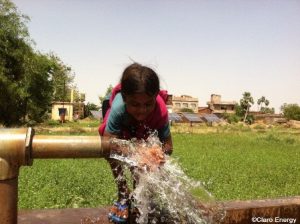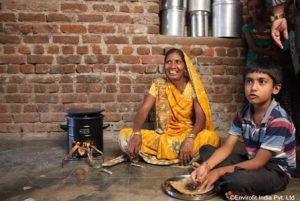Necessary to build a political mandate for Decentralised Renewable Energy
Stating the potential of more reliable and cost-effective DRE, 160 small and medium enterprises working in the clean energy field have appealed to political parties to include and endorse DRE in their manifestos ahead of the General Elections 2019.
 To meet energy requirements of areas and communities which are yet not electrified, Off Grid Renewable Energy better known as Decentralised Renewable Energy (DRE) can be an effective solution. In the form of biomass-based heat and power projects, micro hydro projects or small wind energy and hybrid systems, DRE are more reliable and cost-effective besides generating employment and contributing to sustained climate action.
To meet energy requirements of areas and communities which are yet not electrified, Off Grid Renewable Energy better known as Decentralised Renewable Energy (DRE) can be an effective solution. In the form of biomass-based heat and power projects, micro hydro projects or small wind energy and hybrid systems, DRE are more reliable and cost-effective besides generating employment and contributing to sustained climate action.
Stating the potential and wide-range of applications of DRE, the all India representative organisation Clean Energy Access Network (CLEAN) comprising 160 small and medium enterprises working in the clean energy field have appealed to political parties to include and endorse DRE in their manifestos ahead of the General Elections 2019 which are set to begin from April 11.
Explaining DRE, CLEAN’s President, Svati Bhogle told Delhi Post, “Unlike grid connected renewable energy plants, DRE provide energy to remotest areas which are not dependent or connected to the grid. It refers to any system that uses renewable energy to generate, store (in some cases), and distribute energy in a localised way.”
There are six specific points highlighted in CLEAN’s proposal to political parties. These are recognition of DRE as a central solution in national and state energy planning; promoting investment in DRE; creating rural jobs; reducing carbon emissions; formulation of a National Clean Cooking Mission and resolving regulatory issues of mini-grids.
Some of these indicate that 24×7 electricity to all Indian households and small and medium sized enterprises is possible along with ensuring reliable and quality energy supply through clean and sustainable energy sources.
“They also state that last-mile connectivity issue can be resolved through ensuring effective mini-grids.”
Also read:Promote biotechnology and nano-technology for sustainable agriculture: Vice President
“DRE solutions will help achieve universal energy access by going beyond basic access to energising livelihoods. They are rapidly emerging as promising solutions for rural livelihoods and enterprises. Also, India is the world’s fourth largest carbon emitter. Adoption of DRE would contribute positively to India ratified Paris Agreement to reduce CO2 emissions,” points out Bhogle.
What was the process behind the proposal? “The CLEAN Board was of the view that for the DRE agenda to be taken forward, it was necessary to build a political mandate for the same. Accordingly, the team at CLEAN developed the manifesto and circulated it among its members. There was overwhelming support for the same among the members without any dissenting members,” she told Delhi Post.
 With the aim of bringing together all DRE stakeholders, CLEAN was formed in 2014 and acts as a “facilitative body” to cater to the needs of the sector. “CLEAN is focussed on distributed renewable energy as a safe, reliable, clean energy source. Our efforts are focussed on off grid electricity and renewables based cooking,” she shared.
With the aim of bringing together all DRE stakeholders, CLEAN was formed in 2014 and acts as a “facilitative body” to cater to the needs of the sector. “CLEAN is focussed on distributed renewable energy as a safe, reliable, clean energy source. Our efforts are focussed on off grid electricity and renewables based cooking,” she shared.
Various DRE solutions provided by CLEAN’s members are Solar energy products and services like Lanterns, Home Systems, Microgrids, Pumpsets, Cookers, Refrigerants/Chillers, Desalinators, Charging Stations, Panel trackers etc; Bio-energy- Biogas plants, Biomass gasifiers/microgrids, Improved Cook stoves(household and commercial), Waste to Energy plants etc; Hydro- Pico turbines/water mills, power plants; Wind- Pico turbines, power plants and systems and Hybrid systems (solar-wind, solar-biomass etc.)
“CLEAN’s members who are DRE entrepreneurs operate at the last mile, create rural jobs, and contribute to India’s growth story. The DRE sector is in need of revival and so it deserves the attention of all political parties,” said Bhogle.
“DRE can also be a supplement to grid-provided power or an alternative to grid extension (for example solar pumps) considering that ‘over 400 million people in the country including 47.5 per cent of those in the rural settings still don’t have access to electricity’ according to the Ministry of New and Renewable Energy, Government of India.”
On how DRE has the potential to achieve universal energy access earmarking Sustainable Development Goal 7 of Affordable and Clean Energy, Bhogle said that “sustainable energy generates opportunity – it transforms lives, economies and the planet”.
“SDG 7 affordable and clean energy says (among other things) that ‘Energy is central to nearly every major challenge and opportunity the world faces today – security, climate change, food production, jobs or increasing incomes’. DRE micro grids are a renewables-based fast deployable and affordable clean technology and ensure access to reliable and sustainable energy for all,” opined Bhogle.
Also read:Clouded Consciousness: World’s responses to IPCC Report
The ‘State of the Decentralised Renewable Energy Sector in India’ 2017-18 report by CLEAN estimates that at least 41,868 new jobs were created in 2017/18 in India in the DRE sector.
While Prime Minister Narendra Modi’s Ujjwala Scheme (for providing LPG connections to women from Below Poverty Line households) and Saubhagya Scheme (Rs.16,320-crore scheme to supply electricity to all households) have been hailed for providing clean energy access to the underserved communities, Bhogle stated “DRE can and must co-exist with on-going Government initiatives for energy access”.
“High dependence on firewood for cooking and heating in India and the resultant biomass burning is responsible for around 2,67,700 deaths in India, or nearly 25 per cent of the deaths attributable to PM2.5, making it the single most important anthropogenic source related to mortality in 2015.”
Though a proposal has already been put forward by NITI Aayog for a National Clean Cooking Mission, “The mission needs to be mandated to ensure 100 per cent access to clean cooking technologies, factoring in all available solutions”.
CLEAN’s appeal to the government is to recognise that a vibrant DRE sector offers multiple benefits to the people of India and DRE must be an important component of India’s energy mix.
“It is a request for revival of the DRE sector through sourcing and adopting more clean innovative technology at the last mile, enabling policies, investment through patient capital in the sector and supporting skill development for DRE,” summed up Bhogle.
